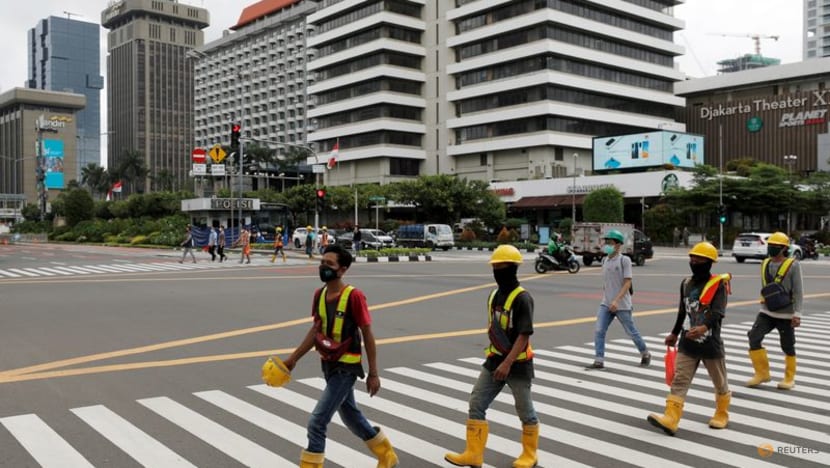Indonesia's Q3 GDP growth slows more than expected, Q4 seen stronger

FILE PHOTO: Construction workers wearing protective masks to prevent the spread of the coronavirus disease (COVID-19) cross a main road in Jakarta, Indonesia, February 5, 2021. REUTERS/Willy Kurniawan
JAKARTA : Indonesia's economic growth slowed more than expected in the third quarter as restrictions to control a deadly wave of COVID-19 weighed on activity, although recent data suggests growth may be getting back on track in the current quarter.
Southeast Asia's largest economy grew 3.51per cent in the July-September quarter from the same period last year, below the previous quarter's 7.07per cent expansion, Statistics Indonesia data showed.
Analysts polled by Reuters had expected growth to slow to 3.76per cent, while government officials had predicted 4.5per cent.
The main stock index slipped to be 0.15per cent down in morning trade after rising 0.3per cent at the open, while the rupiah weakened.
Authorities in Indonesia imposed strict mobility restrictions in July to August in response to a spike in COVID-19 infections.
The virus containment measures hit household consumption, which slowed to 1per cent in the third quarter from 6per cent in the previous three months. Private consumption accounts for more than half of the country's gross domestic product.
Exports contributed the most to GDP expansion on the back of an upcycle in commodity prices.
"3Q likely marked the trough for the year, with 4Q growth likely to strengthen as the caseload has since receded and vaccination ramped up, allowing for restrictions to be unwound," said Radhika Rao, economist with DBS.
More recent data has shown the economic recovery has regained momentum after curbs were gradually eased in late August, with the manufacturing purchasing managers' index (PMI) at an all-time high last month as business disruptions eased.
However, Finance Minister Sri Mulyani Indrawati has warned that rising global inflation, China's economic slowdown and the prospect of monetary tightening in the United States and the European Union could affect Indonesia's growth outlook.
A drop in coal prices could also dampen the contribution to GDP from exports in the fourth quarter, said Josua Pardede, economist at Bank Permata.
"Going forward, economic growth has to come from the private sector, given that the government is planning to reduce its fiscal deficit level," said Fakhrul Fulvian, economist of Jakarta brokerage Trimegah Sekuritas.
The government has said it plans to narrow the budget deficit to 4.85per cent of GDP in 2022 from about 5.4per cent this year.
The central bank has also announced plans to unwind its ultra loose monetary policy by gradually reducing the size of excess liquidity in the banking system next year and consider a rate hike at end-2022.
DBS's Rao said Bank Indonesia may have to tighten monetary policy sooner if the Federal Reserve frontloads U.S. rate hikes.
Before the data release, Sri Mulyani had expected full-year GDP growth of 4per cent, while the central bank's latest forecast was 3.5per cent to 4.3per cent. Indonesia's economy shrank 2.07per cent last year, the first contraction since 1998, due to the impact of the pandemic.
(Reporting by Gayatri Suroyo and Fransiska Nangoy; Editing by Richard Pullin)








